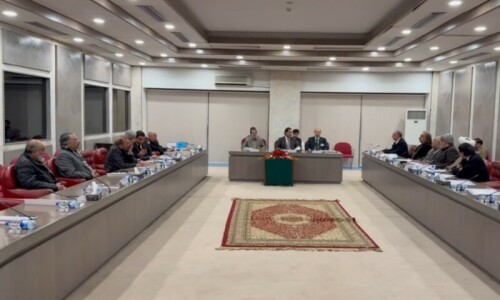Lalah Rukh Malik, 37, still remembers reading about the then emerging science of pharmacogenomics in Young World, daily Dawn, as a child. The article drew the young and curious Malik towards science.
“At school, there was no interactive or first-hand science engagement,” shares Malik, who later pursued molecular biology, and biotechnology at a university in Norway.
After graduation, she worked at Forskerfabrikken (The Science Factory), a science centre, in Norway. In the five transformative years at Forskerfabrikken, Malik discovered her passion for science communication. After spending another one and a half years at the 165-year-old Science Museum in London, she decided to bring the art of science communication to Pakistan.
“At Science Museum, I learnt about creating a science identity for young children by involving them in a meaningful, inspiring and learning experience,” says Malik, a 2020 Malala Fund Education Champion. “To encourage children towards science, I wanted to do something similar in Pakistan, where I feel a science culture is missing.”

Moving back to Pakistan, with the aim to make children here fall in love with science, and to build a new generation of scientists, Malik founded Science Fuse (SF), a social enterprise working for science promotion, especially for girls’ education and participation in science, technology, engineering and maths (STEM).
A social enterprise is breaking stereotypes about science and girls studying it, by making the subject accessible and fun
“Our focus is on engagement programmes, curating resources and advocacy,” shares Arooj Khalid, senior project manager at SF. “The purpose is to attract children to science through written science stories, videos, podcasts, and books.”
“Science teaches you to ask questions, nurtures critical thinking skills, collaboration, communication, and develops wonder and curiosity in children,” says Malik, who finds the overall education system in the country dismal, particularly with regard to science.
“These qualities are essential in every field, and transferable. If young girls are taught these skills, we can change the mindset of our society,” she says.
Atique Ur Rehman, an educationist from Turbat, Balochistan, who is working with the World Bank as a curriculum specialist, points out that, in the rural areas, where the majority of Pakistan’s population resides, people still haven’t been introduced to STEM.
“There are no equipped academies or institutions, nor trained teachers to introduce these fields in rural areas,” he says. “Neither is there information, nor opportunities, and exposure to STEM.”
Rehman adds that the curriculum in government schools is not skill-based, while the textbooks are only description-based, instead of being applied, problem-solving or project-based. “Without integrating the curriculum with scientific fields, students cannot acquire any useful skills,” he says.

Tapping into the potential of girl students in rural areas, SF has collaborated and conducted programmes at various low-income private schools and government schools across the country, including pro-bono programmes such as a remote science summer camp for girls from Balochistan.
In a one-year partnership with The School of Scholars in Khuzdar, Balochistan, run by educationist Sumera Mehboob, SF changed the lives of many young girls from Khuzdar.
“I want to become the first astronaut from Balochistan, go to space, and explore the universe,” says ten-year-old Aleena Baloch. “I love learning science and thinking about space, and the world around me.”
Even after the one-year programme ended, Aleena’s love for science encouraged her to seek out opportunities for herself, and she has taken several online courses on robotics, computer, and other science topics.
“I used to encourage Aleena in educational activities, but she was hesitant,” says Mehboob, who is also Aleena’s mother. “Now she is confident, curious, and teaches science to others.”
“Being an educationist myself, I find a major and commendable difference in teaching science through active learning, instead of conventional rote learning,” says Mehboob. “Even though the programmes run [during the pandemic], at our school by Malik and her team were remote, they were able to connect with the girls in teaching them life-changing, scientific skills.”
A report published by the British Council highlights that, in Pakistan, the majority of girls do not pursue science beyond matriculation, because they feel their male counterparts are more gifted and suited to do science.
“This is shocking, but what else should we expect if we are telling our daughters that science is a male-dominated field,” says Malik. “They need role models to look up to, and we cannot restrict their career options to a select few [fields].”
Malik emphasises that the intervention has to start before girls start thinking science is not for them.
“I want to become a scientist,” says Rida Fatimah, 14, a student of the Junior Leader School Foundation, another low-income private school that SF partnered with in Lahore. Fatimah started attending active learning programmes at ten years of age.
“I feel very inspired by the women scientists we learnt about in an SF programme,” she says. “We were given the title ‘Little Scientists.’”
After learning about genes at an interactive workshop, Fatimah Aqeel, 13, from the same school, chose biology for further studies. “At school, we only read out textbooks without interactive experiments,” she says. “We are confined to our syllabus, and have to memorise everything, which is boring. In SF programmes, we were taught science beyond the syllabus.”
While Malik and her team have been able to inculcate the love for science in Aleena, Rida and Fatimah from under-serviced areas, the state and policymakers have to ensure that they provide basic resources such as electricity and internet to these areas so that more girls can achieve their dreams and become scientists.
The writer is a feature story writer.
She tweets @sommulbaloch
Published in Dawn, EOS, February 20th, 2022















































Dear visitor, the comments section is undergoing an overhaul and will return soon.